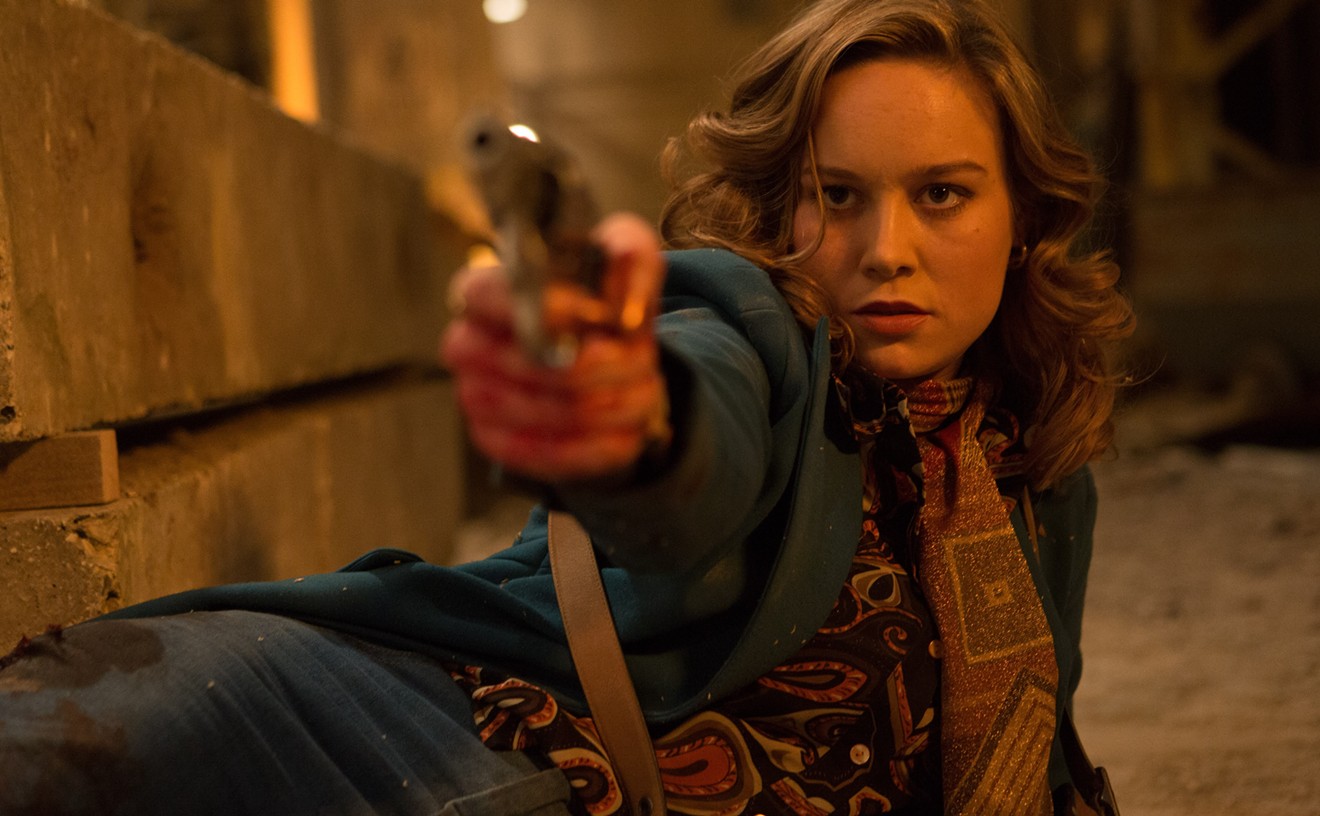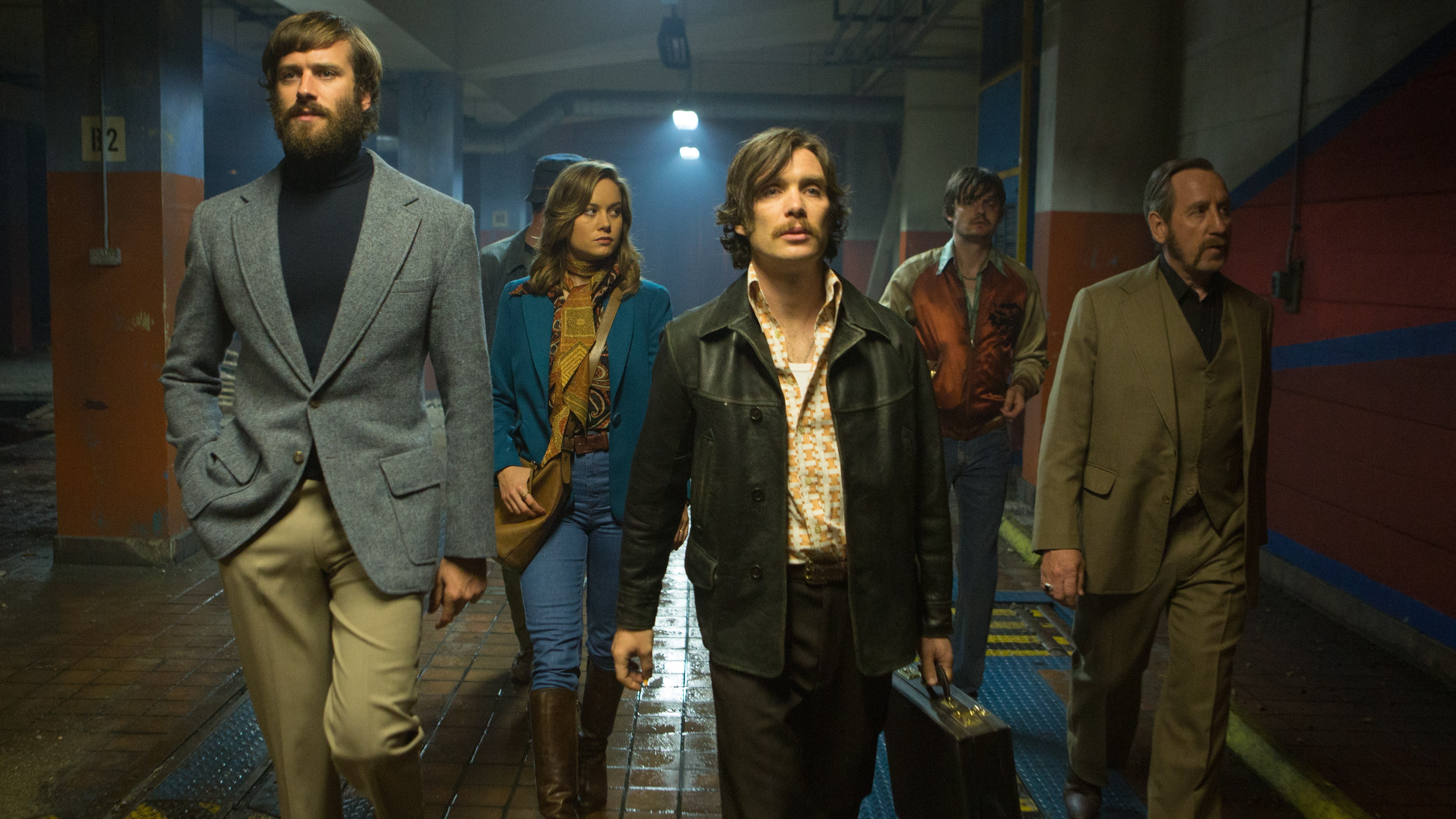Nasty, brutish and not short enough, Ben Wheatley’s Free Fire has a simple — and ultimately simpleminded — premise: to protract what would normally be a brief shoot-out scene to the majority of the movie’s 90-minute running time. On the surface, this reductio ad absurdum has a kind of pleasing Conceptual-art clarity; Free Fire’s animating idea could serve as the prompt for a performance piece, one that’s all climax, no denouement. But Wheatley’s gallows humor has flimsy scaffolding: Only the spectators hang.
Free Fire finds Wheatley — who co-wrote and co-edited the film with his regular collaborator (and spouse) Amy Jump — returning to the 1970s, the same era of his previous feature, last year’s botched J.G. Ballard adaptation High-Rise. And like that earlier movie, which was confined to a 40-story Brutalist tower, an edifice in which the tenants descend deeper into savagery, Free Fire takes place almost entirely in one building, a derelict warehouse in Boston where bodies start to pile up.
Before we arrive at the abandoned structure, though, we keep company with two guys in an RV en route to the destination: Bernie (Enzo Cilenti), the driver, and Stevo (Sam Riley), the passenger, a man who fusses over his bruised face. “I look like I tried to fuck a reluctant panda bear,” he frets while glancing into the side-view mirror. The erotic scenario conjured by Stevo’s self-appraisal is less incongruous than the way he says it: Riley, as with several of the British actors playing Beantown thugs in the ensemble cast, enunciates with an accent more generically Kings County than Southie. (The film was shot in Brighton, UK, where Wheatley lives.)
Bernie and Stevo are the henchmen of Chris (Cillian Murphy, here speaking a more exaggerated version of his native Hibernian), an IRA operative who’s arranged to purchase a cache of M16s from Vern (Sharlto Copley). The South African gunrunner’s distinct articulation baffles Stevo, prompting a dense query that provides one of the film’s few chuckles: “What’s that accent — Swiss or somethin’?” Serving as intermediaries are two Americans of unknown allegiances, Justine (Brie Larson), the sole woman involved in the transaction, and Ord (Armie Hammer), a bearded and turtlenecked egotist who looks like he’s just dashed across the Charles after teaching a night class at Harvard.
Although Vern doesn’t honor his part of the bargain — he’s deliberately brought a trunkload of the wrong type of assault rifle — Chris keeps a cool head. The incident that triggers the chaos and carnage that eats up Free Fire’s remaining hour centers around some unresolved business between Stevo and Harry (Jack Reynor), an employee of Vern’s and the oaf responsible for Stevo’s black-and-blue puss. Visually, what transpires is often incoherent: Who’s being shot at (or otherwise assaulted) and from where isn’t entirely legible, a result that seems to be rooted in the haphazard slicing and stitching of sequences together rather than in calculated audience disorientation. Sonically, Free Fire is even more careless.
The misplaced inflection of Riley and a few of the other actors turns out to be one of the film’s lesser audio infelicities. Two dialect coaches are listed in the credits, but why was no one vetting the script for its surfeit of anachronistic slang and catchphrases? Too often these miscreants speak not in Me Decade idioms but in Y2K colloquialisms. Ord, the most hyperverbal and silver-tongued of the bunch, reassures the crews with “It’s all good”; later he’ll exhort someone, “Slow your roll for a minute.” Stevo reminds a fellow lackey, “He’s not the boss of you.”
While the soundtrack reveals attention to period detail, its predominant vocalist — John Denver — signals the laziest, sub-Tarantino irony; three of the MOR chart-topper’s gentle ballads accompany the spilled blood and brains. 10 minutes early to the Free Fire press screening, I grew restless as “Annie’s Song” played on a continuous loop in the theater; the gimmick filled up my senses with the quickly confirmed fear that Wheatley’s film would rarely rise above the dopey and obvious.
His films were once full of the unexpected, the uncommonly explored. Down Terrace (2009), Wheatley’s first feature, about the pathetic dad-son kingpins of a two-bit syndicate in Brighton, plays as a zingy, caustic kitchen-sink black comedy — one clogged up with a fetid hairball of filial rage, parental scorn, regression and humiliation. The more gruesome violence stems not from criminal behavior, but from the intractable muck of the nuclear family.
Brutality has been a consistent theme in Wheatley’s work, an impoverished topic that, in his debut at least, he vitalized with meticulous attention to the cruelty born of verbal aggression. Free Fire is his sixth film; following High-Rise, which does little more than dramatize the tableaux of bedlam and rot laid out in the source text, it suggests that Wheatley may now only be interested in staging orgies of violence rather than thinking about the psychological writhing that leads to them.
Support Us
Houston's independent source of
local news and culture
account
- Welcome,
Insider - Login
- My Account
- My Newsletters
- Contribute
- Contact Us
Ben Wheatley’s Shootout Drama Free Fire Finds Nothing New in Its Violence
[
{
"name": "Related Stories / Support Us Combo",
"component": "11591218",
"insertPoint": "4",
"requiredCountToDisplay": "4"
},{
"name": "Air - Billboard - Inline Content",
"component": "11591214",
"insertPoint": "2/3",
"requiredCountToDisplay": "7"
},{
"name": "R1 - Beta - Mobile Only",
"component": "12287027",
"insertPoint": "8",
"requiredCountToDisplay": "8"
},{
"name": "Air - MediumRectangle - Inline Content - Mobile Display Size 2",
"component": "11591215",
"insertPoint": "12",
"requiredCountToDisplay": "12"
},{
"name": "Air - MediumRectangle - Inline Content - Mobile Display Size 2",
"component": "11591215",
"insertPoint": "4th",
"startingPoint": "16",
"requiredCountToDisplay": "12"
}
,{
"name": "RevContent - In Article",
"component": "12527128",
"insertPoint": "3/5",
"requiredCountToDisplay": "5"
}
]



